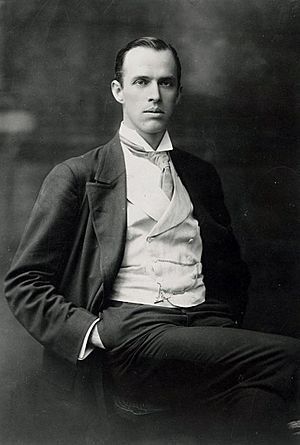William English Walling facts for kids
William English Walling (1877–1936) was an American who worked to improve conditions for workers and was a supporter of socialist ideas. He was born into a wealthy family in Louisville, Kentucky.
In 1903, he started the Women's Trade Union League, an organization that helped women workers. After seeing the terrible Springfield race riot of 1908 in Illinois, he became one of the people who helped create the National Association for the Advancement of Colored People (NAACP) in 1909. The NAACP works for equal rights for African Americans.
Walling wrote several books about socialism in the early 1900s. He later left the Socialist Party because he believed the United States needed to join World War I to defeat the Central Powers.
Contents
Early Life and School
William English Walling was born into a rich family in Louisville, Kentucky. His father, Willoughby Walling, was a doctor who owned a lot of property. His mother was Rosalind (English) Walling. His family had owned slaves before the American Civil War. His mother's father, William Hayden English, was a successful businessman and ran for Vice President in 1880.
Walling went to a private school in Louisville. He also studied at the University of Chicago and Harvard Law School. When his grandfather English passed away while Walling was in college, he inherited money. This allowed him to focus on his interests. He became interested in socialist ideas. In 1900, he moved to New York and became active in social and political movements.
His Work and Impact
Walling became deeply involved in movements for workers' rights and political change. He first worked at Hull House in Chicago, which was a place that helped people in poor neighborhoods. He decided to live on the same amount of money a regular worker earned. In 1900, he moved to New York City and worked as a factory inspector, checking on working conditions. In 1903, he founded the Women's Trade Union League, which supported women in unions.
In 1906, after a long trip to Russia to report on the Russian Revolution of 1905, he married Anna Strunsky. Anna was a writer from San Francisco. They had four children: Rosamond, Anna, Georgia, and Hayden.
In 1908, Walling wrote a book called Russia's Message. It was inspired by the social problems he and his wife saw in Russia. He joined the Socialist Party in 1910 but left it in 1917. He disagreed with the party's view against war. Walling felt that the United States had to join World War I to defeat the Central Powers.
Fighting for Civil Rights
In 1908, Walling and his wife Anna went to Springfield, Illinois. They wanted to investigate a race riot that happened there. During the riot, white people attacked Black people. This conflict was partly due to competition for jobs and big changes happening in the city.
Walling wrote an article called "The Race War in the North" for a magazine called The Independent. He wrote that people needed to help Black Americans achieve "absolute political and capitalist equality." He asked for a "large and powerful body of citizens to come to their aid."
Mary White Ovington wrote to Walling to support his ideas. Many people, both Black and white, and from different religions, were inspired to create a new organization for civil rights. Walling was one of the white people who helped start the NAACP. Important Black leaders like W. E. B. Du Bois also helped found it. Some of their first meetings took place in Walling's apartment in New York. Walling was the first chairman of the NAACP's Executive Committee from 1910 to 1911.
Walling later became a member of the Republican Party. However, he left the party in 1917 because they were against the U.S. joining World War I. His marriage to Anna Strunsky also ended around this time, partly because they disagreed about the war.
Walling later worked full-time for the American Federation of Labor, a large group of labor unions.
Books by William English Walling
- Socialism As It Is – A Survey of The World-Wide Revolutionary Movement (1912/1918)
- The Larger Aspects of Socialism (1913)
- Progressivism and After (1914)
- The Socialists and the War (1915)
- Russia's Message: The People Against the Czar (1917)
- Sovietism: The ABC of Russian Bolshevism—According to the Bolshevists (1920)
 | Victor J. Glover |
 | Yvonne Cagle |
 | Jeanette Epps |
 | Bernard A. Harris Jr. |


